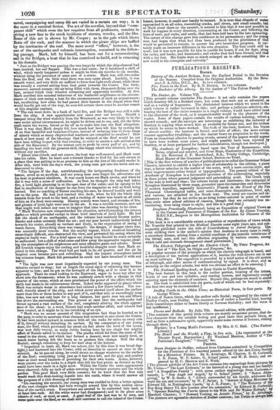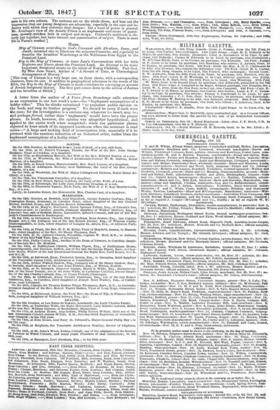PUBLICATIONS RECEIVED.
Books.
History of the Ancient Britons, from the Earliest Period to the Invasion of the Saxons. Compiled from the Original Authorities. By the Reve- rend J. A. Giles, D.C.L., &c. In two volumes. Five Years in the East. By R. N. Hutton. In two volumes. The Bachelor of the Albany. By the Author of "The Falcon Family."
The Doctor, tk. Volume VU. [This seventh volume concludes The Doctor: it not only contains the papas which Southey left in a finished state, but some that were not so advanced, as well as a variety of fragments. The diminished interest which we noted in the sixth volume is rather increased in this; and perhaps a judicious selection, em- bracing the best of the entire remains in a single volume, would have added most to the character of the work, as it unquestionably would to the pleasure of the reader. Some of these papers contain the results of curious learning, others a shrewd remark; and the excerpts are interesting as exhibiting the industry of Southey in copying what struck him as available for future use, and the system on which he seems to have worked. The bulk of the hook, however, has traces of almost senility: the humour is forced, and fails of effect; the more serious manner approaches twaddling; and the matter bears no proportion to the words. From an occasional allusion to passing events, several of the papers would appear to have been written some years, and might possibly have been rejected by Southey, or at least postponed for further consideration, though not destroyed.] The Anabasis of Xenophon: based upon the Text of Bomemann• with
Notes, original and selected, and three Maps, illustrative of the Expedition. By the Reverend J. F. Macmichael, BA., Trinity College, Cambridge, Head Master of the Grammar School, Burton-on-Trent.
[This is the first volume of a series of publications to be called the Grammar School Classics, intended to exhibits higher class of scholarship in the editing, a purer text, a better selection in the matter of the notes, with a more concise style, and other improvements either formal or typographical. The present edition of the Anabasss of Xenophon is a favourable specimen of the undertaking, especially in those points where general judgment and painstaking avail. The Greek type of the text is bold and clear; the volume handy and handsome; the campaign of Xenophon illustrated by three maps, grounded upon the researches and discoveries of modern travellers, especially Ainsworth'e Travels in the Track of the Ten Thousand. Chronological tables, and some illustrative disquisitions, brief, apt, and various, are attached to the Greek text. The notes are concise and ex- planatory: but they do not strike us as being better-selected in point of matter than some other school editions of classics' though they are certainly less en- cumbering, from being closer in style; and this is a good deal.] Deafness Practically Illustrated; being an Exposition of original Views as to the Causes and Treatment of Diseases of the Ear. By James Yearsleys Surgeon to the Metropolitan Institution for Diseases of the Ear, &c. [This book is to a considerable extent a repetition or reproduction of views which Mr. Yearsley first printed in the Medical Gazette some eight years ago, and sub- sequently published under the title of Contributions to Aural Surgery. The most striking view is the author's opinion that deafness in many cases is really a secondary disease, arising from a morbid condition of the mucous membrane of the throat, nose, and ear; this affection originating in various causes, among which cold and stomach derangement stand preeminent.] The Electric Telegraph and the Electric Clock. By Peter Progress, An thor of "The Rail, its Origin and Progress," &c. [A popular account of the principle on which the electric telegraph is based, and a description of the verb= applications of it, besides the well-known one in use on most railways. The exposition is preceded by a brief neat* of the old system of telegraph, and other modes of communicating by signal. It is clear, and as amusing as the subject admits, but with too obvious an effort to be amusing.] The National Spelling-book; or Easy Guide to Useful Knowledge.
[The best feature in this book is the earlier portion, treating of the letters, words of one and two syllables, easy reading lessons, and ingeniously enough entering upon the elements of numbers. Beyond this, perhaps too much is aimed at. The book is subdivided into six parts, each of which can be had separately: the first two may be recommended.]
Dudley Castle in the Olden Time; an Historical Poem, in four parts. By George Wilson.
[A tale of Saxon times, which the author calls feudal; suggested by the ruins of Dudley Castle, near Dudley. The manners are of rather a fanciful kind, bearing little resemblance either to Saxon liberty or Norman feudality ; and the verse is but indifferent.]
Poems and Ballads. By Julia Tilt. Second edition, with additions. [The contents of this pretty little volume are mostly occasional poems, that de- rive character from the amiable feeling and good taste that pervade them, as well as from a submissive spirit, apparently under some reverse of fortune, shining through them.] Marian; or a Young Maid's Fortunes. By Mrs. S. C. Hall. (The Parlour Library.) The Heart and the World; a Play, in five acts. (As represented at the Theatre Royal, Haymarket.) By Westland Marston, Author of "The Patrician's Daughter," "Gerald," &c.
FEINTS.
Seven Designs in Outline, reduced from Cartoons submitted in Competition
for the Premium of five hundred pounds offered by the Art-Union Society for a Historical Picture. By E. Armitage, M. Claxton, E. H. Corbou4 L N. Paton, W. P. Salter, G. Scharf junior, and W. B. Scott; and en- graved by H. C. Slsenton and E. Webb.
[The present portfolio of the Art-Union contains two engravings from pictures by Mr. thrills-- The Last Embrace," or the farewell of a young nun and her family; and "A Neapolitan Family ": with seven outline engravings from Cartoons,— namely, 1. "Non Angli sad Angell," by Cl. Scharf junior; 2. "Saxon Alms- giving," by W. B. Scott; 3. "Alfred, surrounded by his family, addresses Ed- ward his son and successor," by W. P. Salter; 4. "Seizure of Roger Mortimer by Edward ILI. in Nottingham Castle," by J. N. Paton; 5. "The 'Welcome of the Boy-King Henry VI. into London after his coronation," by Edward H. Corboulcl; 6. "Spenser Reading the ?aerie queen to his Wife and Sir Walter Raleigh," by Marshall Claxton; 7. "Howard Visiting an Asiatic Prison," by E. Aeadtage• The pictures are agreeable sketches of Italian customs; but Uwins is always best
seen in his own colours. The cartoons are on the whole clever, and bear out the impression that our young designers are advancing, especially in the care and in- dustry with which they elaborate their designs; but a want of power is general. Mr. Armitage's view of the Asiatic Prison is an unpleasant caricature of gaunt- ness, poverty-stricken both in subject and design. Corbould's multitude is cle- verly put together, but lacks interest and concentration of subject. There is most life in Paton's combat.]
MAPS.
Map of Canaan according to God's Covenant with Abraham, Isaac, and Jacob; intended also to Illustrate the adjacent Countries, and especially to describe the Israelites' Wanderings in the Wilderness from Egypt to the Promised Land.
Key to the Map of Canaan; or Aunt Jane's Conversations with her little Nephews and Nieces about the Promised Land. An Attempt to fix many Important Scriptural events on the minds of Young Children. Part first. By Miss Jane Smart, Author of "A Stream of Time, or Chronological Arrangement of History."
[This map of Canaan is a very large one, on three sheets, with a corresponding clearness, from its size. It addition to geographical references in the words of the Bible, the Key to the Map of Canaan is made a medium for conveying an account of Jewish Scriptural history. The first part comes down to the arrival of Joshua and the Israelites at Shiloh.] A letter from the author of A Voice from Stonehenge calls attention to an expression in our last week's note-the "haphazard assumptions of a hobby-rider." This he thinks calculated "to prejudice public opinion on the book, and stop its further progress." We should be sorry if such were the case; for the investigation is a curious one, whatever its result may be; and perhaps forced, rather than "haphazard," would have been the proper phrase. In truth, however, the opinion was altogether hypothetical, and applied to the entire work when completed; while the particular phrase objected to loses much of its supposed harshness when the sentence is read entire-" A large and tasking field of investigation this, especially if it be pursued with the cautious induction of an historical critic, rather than the haphazard assumptions of a hubby-rider."

























 Previous page
Previous page